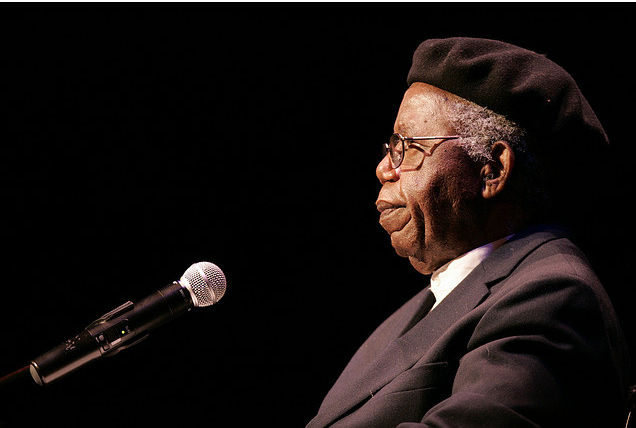Chinua Achebe: “Charity…is the opium of the privileged”
Struggling to stay alive in a hospital bed with a severe, recurring lung infection, the confinement of the infamous, Nelson Mandela, laid a dark cloud of whispered fears and predictions over the recent Easter Weekend. The international mass media scurried around for news of the beloved former South African President’s state of health, apparently ready for his possible imminent passing.
Hailed as the hero of the anti-apartheid movement and saviour of his nation, the first ever black President holds much in common with the loss of perhaps one of the greatest literary canons seen this century. Mandela, personally sought illumination and inspiration in the recently deceased Chinua Achebe, referring to him as a ‘freedom fighter, in whose company the prison walls fell down’.
Unlike Mandela, Nigerian Achebe was far from his homeland, just recently dying in his new home of Boston on March 21st at 82 years of age. The father of the African novel, the first revolutionary post-colonial writer and seen by many as the greatest writer to have never won the Nobel Prize, he was the only Nigerian to twice turn down a national honour in 2004 and 2011.
Achebe, in his final days, became an emblem of an emerging post-colonial continent releasing their imperial oppressed tragedies and finally finding a voice, a pulpit, and a renewed sense of nationhood. Furthermore, whilst perhaps hyperbolised in the act of commemorating such a great man, The Telegraph referred to the writer as a ‘literary Nelson Mandela’, a statement which I believe to be fittingly poetic considering the media frenzy around his contemporary’s ominous illness.
It was Chinua’s debut novel first published in 1958; Things Fall Apart that rocketed him to stardom, translated into 42 languages with over 48 million sales worldwide and to this day has never been out of print. This alone proves his work is totally timeless and an exhilarating, fresh read, as though just yesterday he put pen to paper. Calmly and musically written, the use of the traditional, colonial English language combined with his exploration of the African modern consciousness through tribal identity and song is wholly unique. The juxtaposition of coloniser and colonised facilitated a new dynamic which challenged the original patronising assertion of the barbaric, exotic blacks seen in literature and the West. Instead, Achebe’s novel finally allowed the very real characters to speak freely and without colour or prejudice.
Achebe’s work is saturated with his post-colonial Nigerian upbringing and became the starkly brilliant foundation in his later 1975 work: An Image of Africa: Racism in Conrad’s Heart of Darkness. This critique shook the pillars of Western imperial justification and literatures asking: ‘Can nobody see the preposterous and perverse arrogance in thus reducing Africa to the role of props for the break-up of one petty European mind?’ Achebe went on to write four more novels alongside numerous essay, poems and political works, also finally winning the Man Booker international prize in 2007, nearly 50 years after his first work was published.
Things Fall Apart, the first in his African trilogy, charts a robust, provoking narrative of proud Okonkwo from the Igbo tribe near the Lower Niger and his agrarian, subsistence village community. The first person narrative appears to hold no favouritism or judgment and rather paints a closely knitted African community slowly deconstructed by the English and their weapon of choice: Christianity. It was this cool narration of honest fathers, mothers, daughters and brothers that beguiled me over 4 years ago when I first unsuspectingly opened the book, ignorant of its importance in African literature merely driven by the W.B Yeats reference: ‘Things fall apart, the centre cannot hold’.
Achebe’s ability to unsuspectingly allow the reader to develop his own sympathies towards the Igbo people is indeed a unanimous response. This idea of the Western colonising influence stamping their tiny little feet in order to bring to civilisation to these independent, functioning communities is still relevant today. This guise of moral concern remains present in Western society in order to retain control in regions across the globe. Painted as a need for western governance in places of political turmoil, persecution and poverty, the obsession with civilising and supporting these places remains a double-edged sword of genuine motivations and the old age superiority of Western inventions.
It is this duality which preserves the relevance of Achebe’s work in our new global world; his enduring messages of equality and poisonous colonialism prompt me to recommend this book to anyone and everyone. Achebe’s modern style and subject set him quite apart from anything else I have ever read.

Comments